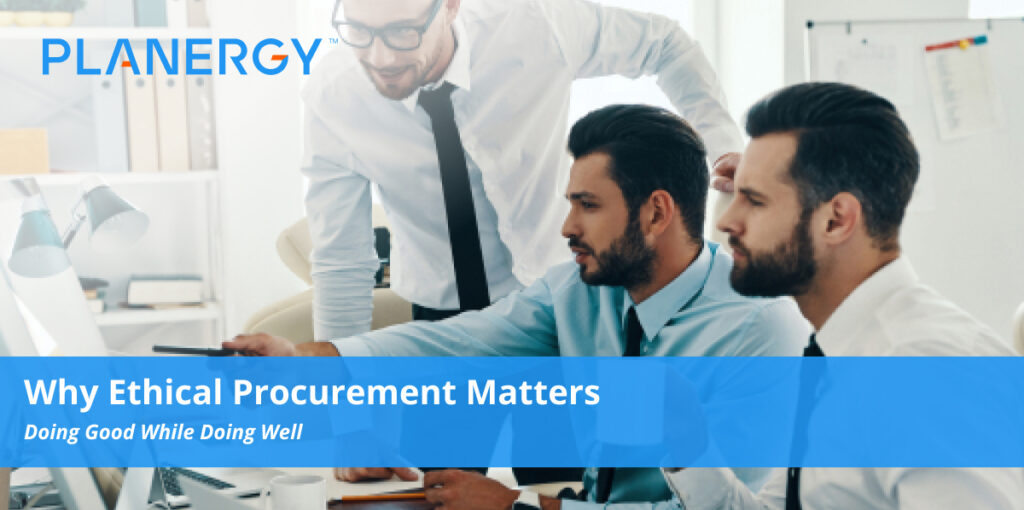Traditionally, the primary goal of most businesses was simply to turn a profit. But companies, like the people who staff them, do not operate within a void, and as the world as grown more interconnected, every business decision can have powerful and lasting ramifications.
It is unsurprising to find, then, that ethical procurement—the practice of balancing return on investment (ROI) against the potential impact that purchasing goods and services has on a company’s supply chain, reputation, and sociopolitical/environmental footprint—has become a driving force for companies seeking ROI in a responsible way.
The value of ethical procurement lies in both tangible and intangible gains for a company.
In order to ensure your company maximizes both, it’s essential to understand what ethical procurement is and how you can make it part of your best practices within the procurement process.
The Importance of Ethical Procurement
In an ideal world, ethical procurement would be the default state of affairs for businesses of all sizes and types; doing the right thing for the company and the right thing for the society the company operates within would be the same.
Which is not to say that ethics and morality are the same thing, of course, but rather that what is ethical is what is just, fair, and consistent with the values one champions.
But as procurement professionals in the real world know, even the sturdiest code of ethics can be severely tested in a world where not everyone is on the side of the light with regard to conflict of interests, human rights, child labour, and other unethical behavior.
For companies, the question of ethical procurement boils down to supply chain management blended with meeting legal, moral, and societal obligations and expectations.
These obligations and expectations are contextual, as different societies have different views on the importance of personal gain in partnership with corporate profits, or the definition of a term like “corruption.”
Regardless of location, however, ethical procurement always requires an understanding of a company’s social responsibility in addition to its legal one—and an intelligent approach to eliminating unethical practices from its procurement activities.
A bribery scandal might create hefty fines, for example, but the lasting damage to a company’s reputation could bring it to its knees if it loses the trust (and therefore the business) of its customer base.
Trust lies at the crux of ethical procurement. Losing it not only damages customer relations and public perception, but supplier relationships and the efficacy of procurement activities themselves.
A company known for unethical behavior may have trouble attracting new potential suppliers, or earning incentives, discounts, and “extra-mile” customer support from existing ones.
They may also attract the wrong sort of suppliers, whose own unethical practices could spell further disaster.
These companies may find themselves under extra scrutiny from government compliance teams, or denied crucial funding by wary financial institutions. Companies that use suppliers who shirk the law, using child labour, disregarding basic human rights, or violating environmental compliance mandates may find themselves excluded from lucrative government bids.
And if the public finds a company’s practices questionable, it can lose millions to boycotts and bad press.
Trust lies at the crux of ethical procurement. Losing it not only damages customer relations and public perception, but supplier relationships and the efficacy of procurement activities themselves.
Ethical Procurement Challenges
For procurement teams, identifying the types of ethical issues a company is likely to face is the first step in developing ethical standards for better business practices.
Modern supply chains are global, complex, increasingly managed with the help of both automation and artificial intelligence, and rife with potential ethics violations.
Consider these examples:
- Bribery: The oldest form of greasing the wheels. Quid pro quo, special considerations or support for specific candidates during supplier evaluation or contract negotiation, or good old fashioned kickbacks are just a few examples.
- Coercion/Intimidation: When threats of loss and harm are offered instead of cash or kickbacks. May occur in tandem with bribery.
- Extortion: On the other side of the bribery mirror lies requests for money in exchange for consideration or to prevent exposure of other corruption. May occur alongside coercion and other unethical behavior, including threats of violence.
- Nepotism: Giving unearned advantage or preference to suppliers who are family or friends.
- Illegal Supply Chain Practices: Purchasing (knowingly or unknowingly) products produced via illegal or immoral means. Covers stolen goods and items produced using child labour (or modern slavery), human rights abuses, and environmentally irresponsible production, as well as counterfeit goods.
- Influence Peddling: The practice of granting contracts (or speaking in support of granting contracts) to a specific supplier in exchange for discounts, special incentives, or other compensation by the party receiving the contract.
These violations, and others like them, can occur at any stage within the procurement function, on both sides of the supply chain, and may even extend to the C-Suite if left unchecked.
Fallen corporations such as Enron, Worldcom, and others provide powerful case studies for the heavy price of unethical behavior, for both the perpetrators and the lives of countless others.
Implementing Ethical Procurement Practices
A code of ethics can be as comprehensive and complex as a novel-sized manual (such as the one issued by the United Nations) or as simple as a Web page outlining a company’s code of conduct and commitment to socially, environmentally, and legally compliant procurement ethics.
The best code of ethics is one that reduces your risk of loss and supports business goals while maximizing your compliance with societal and legal demands.
You can develop an ethical procurement process by following some basic best practices.
Evaluate Potential Ethics Issues in Your Supply Chain
Begin with an in-depth review of your entire supply chain, both direct and indirect, to identify risk exposure created by illegal and unethical practices.
Don’t overlook ancillary practices outside a supplier’s core business; an ostensibly “squeaky clean” supplier may use illegal employment practices in hiring support and cleaning staff, for example, or support human rights abuses in purchasing materials or goods from a third party that violates child labour laws.
Review Your Procurement Team and Existing Ethical Practices
An internal audit of your existing practices and any “special relationships” between staff and vendors will help you identify and eliminate conflict of interests and other violations of your procurement policies and ethical standards.
Prioritize and Streamline
Once you’ve evaluated your chain and procurement function and identified the specific supply management issues and internal practices leading to ethics violations, prioritize the most dangerous and costly, and begin developing a plan to eliminate them.
Connect with others in your industry who are facing the same challenges, or hire ethics consultants to assist in determining your best path forward.
In addition, introducing automation and artificial intelligence to your workflows through implementation of a cloud-based, centralized procure-to-pay system can also help.
Automated workflows with built-in contingencies and three-way matching, combined with integrated supply chain management and intelligent data management, creates a procurement environment where risk-creating theft, rogue spend, and fraud cannot thrive.
Develop and Implement an Ethical Procurement Strategy
In order for ethical standards to succeed, they need support from a formalized, written ethics policy that clearly and completely describes the obligations and expectations imposed upon staff, suppliers, and senior management.
Ideally, your ethical procurement strategy will include:
- Clear, precise language.
- Availability both online and off.
- Initial training for all procurement team staff as well as the organization as a whole, with scheduled refreshers as necessary.
- Information on resources available for further clarification, support for suspected ethics issues, etc.
- Explicit guidelines where required, e.g. maximum dollar values for gifts (if permitted), procedures implemented to avoid undue overlap of staff responsibilities, limits on familial or social relationships between buyers and suppliers, etc.
- Additional context for supply chain management concerns such as sustainable sourcing, limits or bans on suppliers and materials from certain areas of the country or planet, and human rights, financial, or other legal issues that may affect a given supplier’s eligibility to bid for contracts.
- Full-buy-in from senior management and enthusiastic, vocal support for all ethics standards.
- Mechanisms in place to ensure frequent reviews and refinements as events warrant (e.g., changing laws, changes in public support for certain issues, etc.)
Ethical Procurement is the Key to a Responsible ROI
Doing the right thing can be hard for companies as it is for individuals.
But by embracing ethical procurement, your company can protect and enhance its profits, public image, and productivity while also pursuing profitability and innovation—and protecting itself from unnecessary risk, expense, and scandal.




